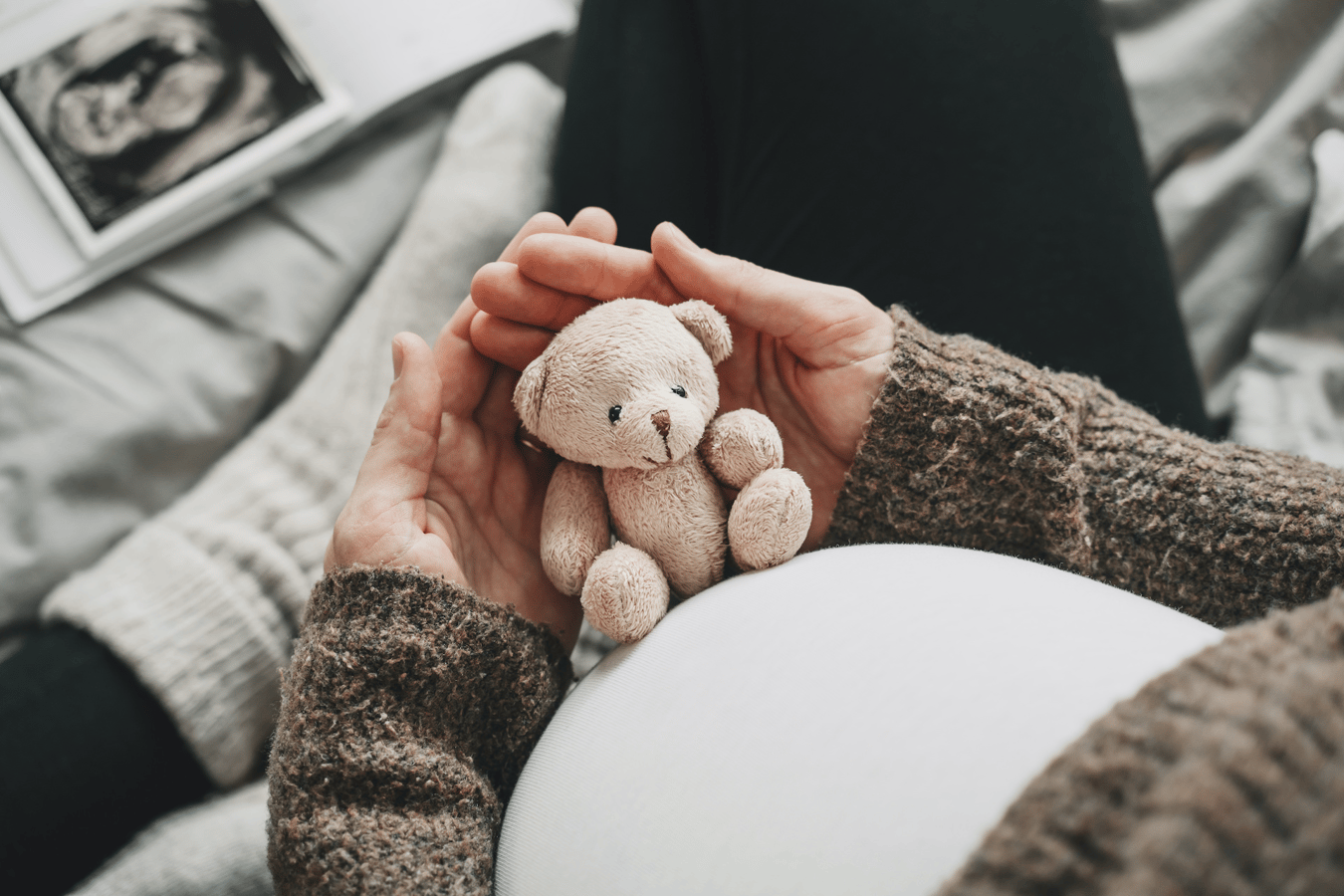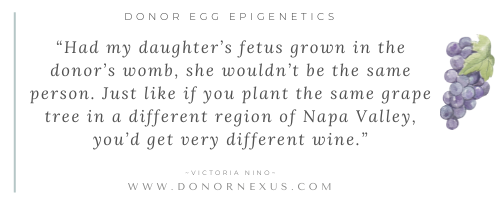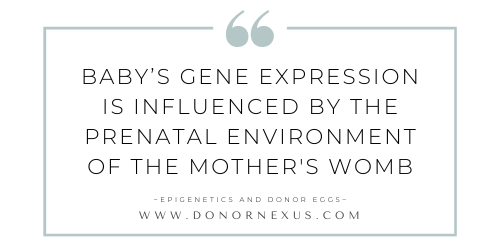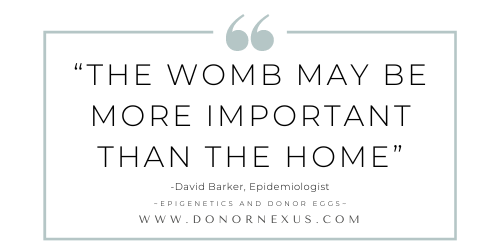
If you're a donor egg recipient mother, this blog dives deep into the amazing scientific connection you establish with your baby during pregnancy through epigenetics. Essentially, epigenetics tells us that you, as the birth mother, can change how your child's genes are expressed. Keep reading to learn all about this fascinating concept and discover how others have experienced it.
Why is Epigenetics Important in the Context of Donor Egg Pregnancies?
Epigenetics reveals that the activity levels of some genes may be turned down (“dimmed”) or turned up in response to external cues from the environment — starting in the womb! Although the gene sequence itself cannot be altered, environmental factors from the birth mother’s body modify the gene expression, or what the gene does. We'll explain exactly how this happens below, but first, find a quick overview and firsthand experience shared beautifully by mother via egg donation Victoria Nino in the video below.

"Without her having my DNA, I still see so many parts of myself in her..."
The Science Behind Epigenetics During Pregnancy
'Epigenetics' refers to changes in gene expression that are transmissible from parent to offspring that do not involve a change in the DNA sequence but have a profound impact on controlling gene expression. (1) This takes place through MicroRNAs, which are short sections of RNA, a chemical relative of DNA.
These microRNAs are secreted in the mother's uterus and act as a communication system between the mother and the growing fetus and are responsible for fine-tuning the activity levels of genes during development.
MicroRNAs send biological and chemical signals to regulate how much functional activity a gene will be putting out.

Which Genes Are Influenced by Epigenetics During Pregnancy?
MicroRNAs have the potential to influence complex networks of gene activity; ranging from things such as growth and development to immunity. The changes in a baby's development due to epigenetic factors from the mother's womb can vary widely. They might influence the baby's health, including risks for certain diseases, physical traits, and even behavioral traits. These epigenetic changes can be due to a variety of factors, including the mother's diet, her stress levels, exposure to pollutants, and other lifestyle choices. It's a complex interplay that shows how the environment directly interfaces with our genetics, however, further studies are needed to fully understand the extent of epigenetic changes.
If I Use a Donor Egg, Will the Baby Have Any of My DNA?
 Although a baby born via a donor egg will not share your DNA, you still share a profound physical connection. Although certain characteristics may be genetically inherited from the egg donor, male partner, or sperm donor, the baby is still growing from your body.
Although a baby born via a donor egg will not share your DNA, you still share a profound physical connection. Although certain characteristics may be genetically inherited from the egg donor, male partner, or sperm donor, the baby is still growing from your body.
After the implantation of the embryo and throughout the entire pregnancy, every cell in the baby’s body is influenced by the birth mother’s body. They work together. All the nutrients that you are using to fuel your body are helping to build the little human inside of you; the baby starts absorbing nutrients secreted from the endometrium (the tissue lining the uterus) from the earliest stages of pregnancy onwards. The baby lives in your embryonic fluid, shares your blood flow, and even knows your voice and the rhythm of your heartbeat.
As shared by Victoria,
Read more from Victoria on this topic in this related blog post: If I Use Donor Eggs, Will My Baby Look Like Me?"Through Biology, I gave my daughter everything she needed. She had a healthy DNA blueprint from her egg donor and her father, but my body gave her life and nurtured her into the human she is. Genetics gave her, her physical appearance (a beautiful one I might add) but epigenetics is what made her who she really is, at her core, her essence, her grit, her compassion. I continue to discover new biological connections I have to her as she grows, which started the moment she was born - my mom kept talking about how much she smelled like me when I was a baby, and at the time I figured it was just a normal baby smell, but later learned it’s an actual biological connection we share."
Epigenetics and Donor Eggs: The Profound Role of Gestational Environment
 The British epidemiologist David Barker suggested that the environment in the womb might have a more significant impact on an individual's development than their upbringing. He highlighted the crucial influence of conditions during pregnancy on the growth of the embryo, the fetus, and eventually the adult's health and characteristics.
The British epidemiologist David Barker suggested that the environment in the womb might have a more significant impact on an individual's development than their upbringing. He highlighted the crucial influence of conditions during pregnancy on the growth of the embryo, the fetus, and eventually the adult's health and characteristics.
You Provide Your Child's First Home
Not only does epigenetics begin in the womb, but several studies suggest that the most fundamental impact on gene function occurs in utero. This means that your womb serves as the first, and most impactful, environment for your baby. Studies suggest that gene activity may be altered by factors present in the womb even before implantation. This means that the mother’s lifestyle choices from even before conception, and especially throughout gestation, have an impact on the overall health of the child for the rest of their lives.
Nurturing Your Baby's Prenatal Environment

With carrying your baby, you carry the responsibility for creating a healthy environment to nurture the child's development throughout gestation; an environment that will contribute to how your child's genes develop and impact their health throughout their entire life. For specific health recommendations, consult with your physician and begin implementing healthy lifestyle changes sooner rather than later!
Find Additional Resources and Inspiration in the Donor Nexus Blog:
- Navigating Donor Conception: Understanding Privacy vs. Secrecy
- Grieving Your Genetics and Embracing Donor Eggs
- Should I Use Donor Eggs? Will I Have Any Regrets?
- Explaining Donor Conception to Your Child: Dos and Don'ts
- 7 Potential Disadvantages of Using Donor Eggs to Consider
References:
1. Chuang JC, Jones PA. Epigenetics and microRNAs. Pediatr Res. 2007 May;61(5 Pt 2):24R-29R. doi: 10.1203/pdr.0b013e3180457684. PMID: 17413852. https://pubmed.ncbi.nlm.nih.gov/17413852/
2. Zuccarello, D., Sorrentino, U., Brasson, V. et al. Epigenetics of pregnancy: looking beyond the DNA code. J Assist Reprod Genet 39, 801–816 (2022). https://doi.org/10.1007/s10815-022-02451-x

